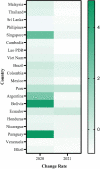Effects of COVID-19 Non-Pharmacological Interventions on Dengue Infection: A Systematic Review and Meta-Analysis
- PMID: 35663468
- PMCID: PMC9162155
- DOI: 10.3389/fcimb.2022.892508
Effects of COVID-19 Non-Pharmacological Interventions on Dengue Infection: A Systematic Review and Meta-Analysis
Abstract
Non-pharmacological interventions (NPIs) implemented during the coronavirus disease 2019 (COVID-19) pandemic have demonstrated significant positive effects on other communicable diseases. Nevertheless, the response for dengue fever has been mixed. To illustrate the real implications of NPIs on dengue transmission and to determine the effective measures for preventing and controlling dengue, we performed a systematic review and meta-analysis of the available global data to summarize the effects comprehensively. We searched Embase, PubMed, and Web of Science in line with PRISMA (Preferred Reporting Items for Systematic Reviews and Meta-Analyses) guidelines from December 31, 2019, to March 30, 2022, for studies of NPI efficacy on dengue infection. We obtained the annual reported dengue cases from highly dengue-endemic countries in 2015-2021 from the European Centre for Disease Prevention and Control to determine the actual change in dengue cases in 2020 and 2021, respectively. A random-effects estimate of the pooled odds was generated with the Mantel-Haenszel method. Between-study heterogeneity was assessed using the inconsistency index (I2 ) and subgroup analysis according to country (dengue-endemic or non-endemic) was conducted. This review was registered with PROSPERO (CRD42021291487). A total of 17 articles covering 32 countries or regions were included in the review. Meta-analysis estimated a pooled relative risk of 0.39 (95% CI: 0.28-0.55), and subgroup revealed 0.06 (95% CI: 0.02-0.25) and 0.55 (95% CI: 0.44-0.68) in dengue non-endemic areas and dengue-endemic countries, respectively, in 2020. The majority of highly dengue-endemic countries in Asia and Americas reported 0-100% reductions in dengue cases in 2020 compared to previous years, while some countries (4/20) reported a dramatic increase, resulting in an overall increase of 11%. In contrast, there was an obvious reduction in dengue cases in 2021 in almost all countries (18/20) studied, with an overall 40% reduction rate. The overall effectiveness of NPIs on dengue varied with region and time due to multiple factors, but most countries reported significant reductions. Travel-related interventions demonstrated great effectiveness for reducing imported cases of dengue fever. Internal movement restrictions of constantly varying intensity and range are more likely to mitigate the entire level of dengue transmission by reducing the spread of dengue fever between regions within a country, which is useful for developing a more comprehensive and sustainable strategy for preventing and controlling dengue fever in the future.
Keywords: COVID-19; dengue incidence; meta-analysis; mobility restrictions; non-pharmacological interventions.
Copyright © 2022 Wu, Dong, Li, Yi, Hu, Guo and Lu.
Conflict of interest statement
The authors declare that the research was conducted in the absence of any commercial or financial relationships that could be construed as a potential conflict of interest.
Figures



References
-
- Brigade M. N. (2020). Summary of the Latest Policies on Entry Quarantine in Various Countries. Available at: http://www.k1u.com/trip/86303.html (Accessed 7 February 2022).
Publication types
MeSH terms
LinkOut - more resources
Full Text Sources
Medical

